‘Entertain them with what entertains them....’ said Prophet Mohammed fourteen hundred years ago. For some inexplicable reason these were the words that rang in my ears as I stood transfixed in Andheri Sports Complex among at least fifty thousand people who were there to be entertained with the yearly “Kushti” contest a few months ago. I could hardly believe that this upmarket complex, which has been host to performances of stars from Bollywood and to Michael Jackson, was now the battle ground for a seemingly ‘desi’ wrestling match, where the stage was covered in mud and gravel, and semi naked men from Benares to Pakistan grappled with each other, while the crowd roared.
“Who are these people and where have they all come from?” I asked Sanjay Nirupam, the hardliner Shiv Sena MP turned Congressman. “These are the people who are the back bone of your city and entertainment capital. Unfortunately, they have disappeared from your Bollywood radar. You guys used to make a Ganga Jamuna and Nadiya ke Paar, but now you have started catering to the Indian diaspora abroad, with films like Black and Kal Ho Na Ho, so its left to us to entertain these lonely people who are dislocated from their Indian heartland,” he said, subtly driving home his point.
It was then that with frightening clarity it dawned on me…. These are the people who have resurrected the Bhojpuri cinema which is over shadowing our self-proclaimed intelligent new age cinema today, and providing livelihood to a major bulk of our entertainment industry. “Give us back our movies,” was the unheard and unheeded cry of twenty five crores of people in the Indian heartland, who progressively discovered that the prominent film makers from Bollywood weren’t making films which mirrored their ethos, culture and language. It is the immigrant population who have left their homes and gone to the major cities in India, and are cut away from their families, land and language, which constitute the major bulk of the consumer base of the Bhojpuri films which run to full houses in Mumbai, Ahmedabad, Punjab, Rajasthan and even Chennai!
My long standing friend Shailendra Goyal, who made his foray into the world of Bhojpuri films with Ganga Mile Sagar Se, and which was adjudged the best Bhojpuri film of 2005, in the first Bhojpuri film award function, staggered me by saying that Sasura Bada Paise Vala did better business in Bihar than last year’s Bunty Aur Babli. Did you know that Dehati Babu ran for one whole week in Hyderabad? Where big budget Hindi films at times are pulled out after three days? Bhojpuri films find takers in countries like Mauritius, Surinam and even Bangladesh, where the Indian migrant labourer had settled down so many years ago, but still hungered for his roots and particular culture.
So what makes Bhojpuri cinema tick? “It’s like having home cooked food,” said Ravi Kishen, who is the biggest male star of the Bhojpuri film industry. Bollywood has ignored the issues of a villager and is catering to a class which is rooted in cities and fast-food culture. The reason there is an India where Manoj Tiwari Mridul serenades a huge sea of humanity and finds a space in their hearts more than a Shah Rukh Khan can, is because he still represents those core values which his ancestors brought him up on, and through which he feels mankind will find sustenance.
Its time for us to face the obvious —that there is an India whose value system believes in denying and saving. This is the working class which believes in slogging and saving for a better tomorrow, as opposed to the other India, which believes that satisfaction lies in spending, and wants instant gratification at any cost.
Obviously, these are two different universes which require two different kinds of stories. And since the first and the last rule of Bollywood has always been the same, which is make movies to make money, it has chosen to cater to the rich Indian diaspora and the urban multiplex consumer which has deeper pockets in comparison to its poorer counterpart. When an Asian in UK spends ten pounds to see a Bollywood film, and a native of Bihar finds it difficult to scrape together even ten rupees back home, its obvious which side the film industry will be on.
However, would it not be prudent to read the writing on the wall? Which is that if there are two India's today, with growing audiences in both sectors, then why not cater to both? In any business and Bollywood is no exception, it is demand which initiates supply. And while there is no longer a pan Indian audience which will consume collectively one kind of cinema, it would be foolish of Bollywood only to cater to one section and not the other. Doing so would only serve to alienate itself from its own heartland, which would be a complete catastrophe.
The writer is a filmmaker.
Tuesday, October 10, 2006
Manthan-AIF appreciation for Community Broadcasting to RADIO RAGHAV, MANSOORPUR
Raghav FM Mansoorpur
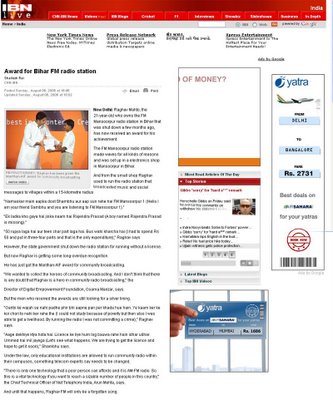
Product Description
Raghav Accepting the Appreciation
Rural and discreet Raghav Mahto started the community FM radio using a fifty rupee technology device that served the entire Mansoorpur village in his Vaishali District of Bihar as well as adjoining villages. He and his RJ (Radio Jockey) friend Sambhu started an innovative Rural FM service which enabled villagers and the local community to benefit from various services it offered. People at large benefited from announcements, messages, entertainments that touched their health, educational, trade, commerce, entertainment needs on day-to-day basis. Using an innovative knowledge enhancement & awareness driven simple technological platform, Raghav and his community FM served community needs and services in every possible way. The community FM was for the community and by the community, driven by community needs and demands. What was more unique was the manner in which the community embraced Raghav FM and become emotionally well attached to it. This was vividly revealed by the community members in sorrow and anger when Raghav FM was shut down in March 2006 after it served its listeners with grace and humility for more than 4 years, albeit unofficially.
ORGANISATION
Raghav FM Mansoorpur
LOCATION
Bihar
CONTACT
Raghav Mahto
09430262067
TECHNOLOGY/MEDIUM
FM/Community Radio
LANGUAGE
Bhojpuri, Hindi

Product Description
Raghav Accepting the Appreciation
Rural and discreet Raghav Mahto started the community FM radio using a fifty rupee technology device that served the entire Mansoorpur village in his Vaishali District of Bihar as well as adjoining villages. He and his RJ (Radio Jockey) friend Sambhu started an innovative Rural FM service which enabled villagers and the local community to benefit from various services it offered. People at large benefited from announcements, messages, entertainments that touched their health, educational, trade, commerce, entertainment needs on day-to-day basis. Using an innovative knowledge enhancement & awareness driven simple technological platform, Raghav and his community FM served community needs and services in every possible way. The community FM was for the community and by the community, driven by community needs and demands. What was more unique was the manner in which the community embraced Raghav FM and become emotionally well attached to it. This was vividly revealed by the community members in sorrow and anger when Raghav FM was shut down in March 2006 after it served its listeners with grace and humility for more than 4 years, albeit unofficially.
ORGANISATION
Raghav FM Mansoorpur
LOCATION
Bihar
CONTACT
Raghav Mahto
09430262067
TECHNOLOGY/MEDIUM
FM/Community Radio
LANGUAGE
Bhojpuri, Hindi
Bhojpuria.com Manthan-AIF Award 2006 Winners
What is MANTHAN - AIF Award
The Manthan Award is an Indian initiative by Digital Empowerment Foundation, India as the national initiative of World Summit Award, to select and promote the best practices in e-Content and Creativity in India. It involves representatives from each state and union territory of India and visualizes the bridging of digital divide and narrowing of the content gap as its overall goal.
For The Manthan Award 2006, American India Foundation has come forward to become the Principal Partner. Thus the Manthan Award now is called The Manthan-AIF Award 2006
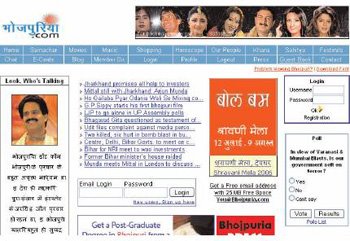
Bhojpuria.com
Product Description
World's first Portal for Bhojpuri Speaking people. The site attempts successfully to provide a holistic and a global platform for more than 34 Crore Bhojpuri speaking people across the Globe. One can find News, Bhojpuri Songs, Bhojpuria Dukan, Free E-mail, Bhojpuri E-greetings, ecards, Bhojpuria culture, Festivals etc through the online platform. The site is a value addition in itself with continuous information and coverage on latest and vital perspectives of life of Bhojpuri community. The site is a great wholesome service provider and entertainer with resourceful information on vital aspects of the community like matrimony, books, events and so on.
Citation
An online communication and networking platform is a great value addition for any group or community. Bhojpuria.com provides such a platform to the worldwide Bhojpuria population providing news and views from Bhojpuria region, and Bhojpuri Film industry. The aim is to connect the young generation from the 34 crore strong Bhojpuria community worldwide through its language, Bhojpuria
Bhojpuria.com is not just a website; it’s a way of life. The basic features are Online Shopping, People, Bhojpuri Sahitya, Khana, Festivals, Member's directory, and several others.
SUDHIR ACCEPTING THE AWARD
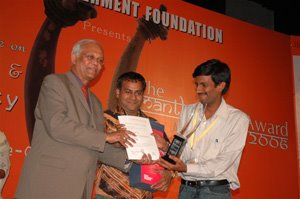
ORGANISATION
Infogate Exporters Pvt. Ltd
LOCATION
Jharkhand
CONTACTS
Sudhir Kumar
0657-2271219
kumar@bhojpuriya.com
URL
www.Bhojpuria.com
TECHNOLOGY/MEDIUM
Broadband/Online
LANGUAGE
Bhojpuri
The Manthan Award is an Indian initiative by Digital Empowerment Foundation, India as the national initiative of World Summit Award, to select and promote the best practices in e-Content and Creativity in India. It involves representatives from each state and union territory of India and visualizes the bridging of digital divide and narrowing of the content gap as its overall goal.
For The Manthan Award 2006, American India Foundation has come forward to become the Principal Partner. Thus the Manthan Award now is called The Manthan-AIF Award 2006

Bhojpuria.com
Product Description
World's first Portal for Bhojpuri Speaking people. The site attempts successfully to provide a holistic and a global platform for more than 34 Crore Bhojpuri speaking people across the Globe. One can find News, Bhojpuri Songs, Bhojpuria Dukan, Free E-mail, Bhojpuri E-greetings, ecards, Bhojpuria culture, Festivals etc through the online platform. The site is a value addition in itself with continuous information and coverage on latest and vital perspectives of life of Bhojpuri community. The site is a great wholesome service provider and entertainer with resourceful information on vital aspects of the community like matrimony, books, events and so on.
Citation
An online communication and networking platform is a great value addition for any group or community. Bhojpuria.com provides such a platform to the worldwide Bhojpuria population providing news and views from Bhojpuria region, and Bhojpuri Film industry. The aim is to connect the young generation from the 34 crore strong Bhojpuria community worldwide through its language, Bhojpuria
Bhojpuria.com is not just a website; it’s a way of life. The basic features are Online Shopping, People, Bhojpuri Sahitya, Khana, Festivals, Member's directory, and several others.
SUDHIR ACCEPTING THE AWARD

ORGANISATION
Infogate Exporters Pvt. Ltd
LOCATION
Jharkhand
CONTACTS
Sudhir Kumar
0657-2271219
kumar@bhojpuriya.com
URL
www.Bhojpuria.com
TECHNOLOGY/MEDIUM
Broadband/Online
LANGUAGE
Bhojpuri
Thursday, October 05, 2006
Publication of research paper title Bhojpuri Proverbs :: A Culture Study by Dr SD Ojha
Bhojpuri Kahawaten- Ek Sanskritik Adhyayan By Dr SD Ojha
This book was released in Jamshedpur on 3rd June in a function organized by Jamshedpur Bhojpuri Sahitya Parishad. The vimochan was done by Sri Nagendra Prasad
Singh who is the chairman of Akhil Bhartiya Bhojpuri Sahitya Parishad Patna. This function was covered by the leading Hindi dailies of Jamshedpur: Hindustan, Dainik jagran and Prabhat Khabar.
The book has just been published by Vani Prakashan, Delhi. It is a valuable source of information on the evolution of & history Bhojpuri language and culture and the this must be possessed by all Bhojpuri lovers for knowledge and reference of bhjopuri.
This book has 416 pages, hard bound and is priced at Rs 425.
You can contact Sri Santosh Ojha to order this book at santoshojha1@yahoo.com
Press Coverage of the release of this book
Prabhat Khabar
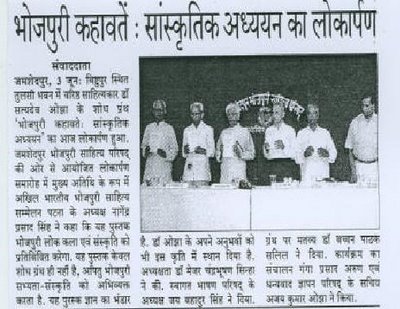
Hindustan
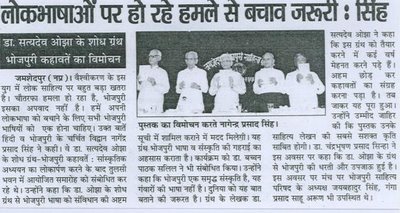
Dainik Jagaran
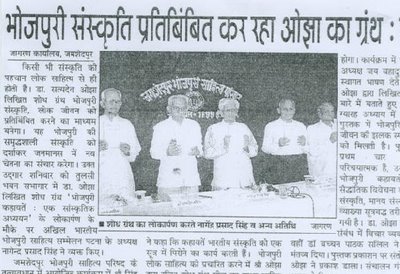
An Introduction by the Publisher

This book was released in Jamshedpur on 3rd June in a function organized by Jamshedpur Bhojpuri Sahitya Parishad. The vimochan was done by Sri Nagendra Prasad
Singh who is the chairman of Akhil Bhartiya Bhojpuri Sahitya Parishad Patna. This function was covered by the leading Hindi dailies of Jamshedpur: Hindustan, Dainik jagran and Prabhat Khabar.
The book has just been published by Vani Prakashan, Delhi. It is a valuable source of information on the evolution of & history Bhojpuri language and culture and the this must be possessed by all Bhojpuri lovers for knowledge and reference of bhjopuri.
This book has 416 pages, hard bound and is priced at Rs 425.
You can contact Sri Santosh Ojha to order this book at santoshojha1@yahoo.com
Press Coverage of the release of this book
Prabhat Khabar

Hindustan

Dainik Jagaran

An Introduction by the Publisher

Sunday, October 01, 2006
Women to help build Brand Bihar
PATNA: Women entrepreneurs are to help build Brand Bihar by showcasing the art, craft and cuisine of the state.
Bihar Mahila Udyog Sangh (BMUS) - a body of women entrepreneurs - will hold exhibitions in New Delhi, Mumbai, Kolkata and Bangalore to display the state's handicrafts.
"BMUS wants to market Bihar as a brand by showcasing products that have not been shown before. We will invite entrepreneurs from across the country to see our handicrafts," Pushpa Chopra, president of BMUS, told IANS.
"We plan to join hands with the government to market the products," she said.
BMUS was formed in 1996 to promote rural and cottage industries. Its annual fair in Patna provides a platform to women entrepreneurs to market their products.
A recent market survey shows a high demand for such artefacts in the metros. "If the government helps us we will market Brand Bihar in a big way," said Usha Jha, secretary of BMUS.
Keen to attract investment in agriculture, health, IT and tourism, Bihar will hold its first global meet early next year to attract NRI and foreign investment.
"The famous Madhubani paintings, Tikuli work, bamboo crafts, Sujni, a rare hand embroidery, and appliqué work will be showcased at the exhibitions," Jha said.
Food items like 'litti chokha', 'makhana', 'sattu', litchi squash, honey and 'badi' will also be sold along with the handicrafts.
This year the BUMS fair will be held from Sep 14 to 18. Apart from entrepreneurs from Bihar, women traders from Punjab, Haryana, Rajasthan, Delhi, Uttar Pradesh, Jharkhand, West Bengal, Andhra Pradesh and Maharashtra have also been invited to the fair.
"It's time to showcase Bihar's handicrafts because they reflect the culture of the state," said Indu Agrawal, vice president of BMUS.
Bihar Mahila Udyog Sangh (BMUS) - a body of women entrepreneurs - will hold exhibitions in New Delhi, Mumbai, Kolkata and Bangalore to display the state's handicrafts.
"BMUS wants to market Bihar as a brand by showcasing products that have not been shown before. We will invite entrepreneurs from across the country to see our handicrafts," Pushpa Chopra, president of BMUS, told IANS.
"We plan to join hands with the government to market the products," she said.
BMUS was formed in 1996 to promote rural and cottage industries. Its annual fair in Patna provides a platform to women entrepreneurs to market their products.
A recent market survey shows a high demand for such artefacts in the metros. "If the government helps us we will market Brand Bihar in a big way," said Usha Jha, secretary of BMUS.
Keen to attract investment in agriculture, health, IT and tourism, Bihar will hold its first global meet early next year to attract NRI and foreign investment.
"The famous Madhubani paintings, Tikuli work, bamboo crafts, Sujni, a rare hand embroidery, and appliqué work will be showcased at the exhibitions," Jha said.
Food items like 'litti chokha', 'makhana', 'sattu', litchi squash, honey and 'badi' will also be sold along with the handicrafts.
This year the BUMS fair will be held from Sep 14 to 18. Apart from entrepreneurs from Bihar, women traders from Punjab, Haryana, Rajasthan, Delhi, Uttar Pradesh, Jharkhand, West Bengal, Andhra Pradesh and Maharashtra have also been invited to the fair.
"It's time to showcase Bihar's handicrafts because they reflect the culture of the state," said Indu Agrawal, vice president of BMUS.
His new republic of Bihar

Aditi Phadnis / New Delhi September 30, 2006
Aditi Phadnis journeys to the badlands of Lalu Prasad's former fiefdom, and comes away impressed by Nitish Kumar's initiatives.
The foetid smell of sweat, raw onions, garlic and mustard oil rises in the still, humid air of 1, Anne Marg as thousands collect in the sweltering heat to meet the chief minister of Bihar.
This is Nitish Kumar’s Janata Durbar, held at his residence twice a week. People spread their gamchhas under the trees outside the CM’s residence and sleep there to ensure they can meet Kumar the following morning.
Usually, their problems relate to unemployment, ex gratia medical relief, poverty, transfers and postings, police brutality and oppression...all the existential problems of any villager, all resolvable at the district level but imported to the Patna because of a dormant administration.
A young woman tugs at a security official’s sleeve. “I don’t have a petition,” she says, on the verge of hysterical tears. “I paid Re 1 to someone to write out my petition but he took my money and walked off.”
An officer is summoned and an application is written on her behalf. This will be entered in a data base designed by Tata Consultancy Services to enable the CM’s secretariat to track the complaint and redress it if the district administration doesn’t act on it.
Nitish Kumar arrives at the meeting with a cavalcade of bureaucrats. Every application is entered in the data base, and when the CM gets it, he hands out redressal on the spot. “Get me the Muzaffarpur SP,” he demands. A woman weeps in front of him. “This woman is a Dalit. Her children have been killed. Why isn’t the thana registering an FIR?” he yells on the mobile.
“There is no such thing as a ‘little’ height,” he tells a young man pleading with him to use his influence and get him admitted to the police overlooking a “small problem” — his height.
The scenes are not peculiar to Bihar. Every chief minister encounters them though Lalu Prasad and Rabri Devi never felt the need for such an exercise in their 15 years in office. Kumar is trying to bring governance back to Bihar after a long absence. Advocate general P K Shahi recalls the way the change in the state was relayed to him.
“It was the day after the election results and Nitish Kumar was to take oath. The chief minister told me to make preparations for the panchayat elections. I explained that the matter was before the Supreme Court in the form of a Special Leave Petition. He said, ‘Do what you want. I want the elections’.”
Within a day of assuming office, Kumar held a meeting with his bureaucrats and explained how he wanted things run.
For the first time in its history, the police in the state were asked to prioritise their job. Two problems were identified: one, gunslingers involved in extortion, intimidation and sometimes abduction by “bahubalis” (mafia lords). Second, abductions as an industry. Cases were divided into two categories based on their primacy and how recent they were. And then the Bihar police got down to the painful task of solving them.
“The challenge was obvious. The older the case, the harder it was to get evidence. Alongside, we also wanted to make an example of recent crimes. The message we wanted to send was: ‘Don’t think you can commit a crime and get away with it. Because you can’t, not now,” says additional DG of police (operations) Anil Sinha.
Once the police understood that criminals were going to get no political protection, they decided to go after them. The Arms Act is beautiful in its simplicity.
Nothing more than a sub inspector’s testimony is required to prosecute a criminal, so reports of arrests from districts began pouring in. The criminals were chargesheeted in three days, brought before a fast track trial court and convicted even before they could ask for bail.
In other states these incidents would be commonplace; in Bihar they are unbelievable. Now the second phase of operations has started: the arrest of those against whom FIRs have been lodged.
When arrest orders against minor “bahubalis” Sunil Pandey and Anant were issued, Bihar was in a state of shock. Both were sitting MLAs from the Janata Dal U, Nitish Kumar’s party.
Uncertain of their fate, the police went to Pande’s home, and though they knew he was inside, did not arrest him, merely pasted the proclamation on his door and returned. Inside, Pande granted interviews to television channels. When this was brought to Kumar’s notice, he publicly reprimanded the police brass.
The result of these moves has been nothing short of dramatic. Where earlier Patna cinema halls never screened evening and night shows, now they are sending cash registers ringing hysterically. Retail sales are up — people who used to visit shops only during the festive and marriage season are crowding shopping centres like Mauryalok.
Young people can be spotted waiting for a table in the swisher restaurants of the capital. Shops are open till 9 pm. Young women think nothing of going for a morning jog at Gandhi Maidan, the sprawling park in the centre of Patna.
Says principal secretary to the chief minister, R C P Singh: “Last month we logged 27 convictions a day. Of these, eight per day were for life imprisonment. In September we expect this to go up. In the last eight months we have convicted around 3,000 people in cases of heinous crime — murder, kidnapping and murder — and 2,000 people have been convicted in other crimes.”
The gain? “Once convicted, the person cannot get any government contract. Nor can he contest elections,” says a police officer.
Can the government sustain the momentum? Apart from an inefficient, corrupt and demoralised force, there are objective problems: lack of training and manpower shortages.
But the Bihar government has hit on a unique scheme that the President of India commended when he visited the state. It has already recruited 5,000 retired soldiers who have been banded as the Special Auxiliary Police for constabulary and cordon and search operations.
Therefore, when you have an incident like the Jehanabad jailbreak case, or where the local police is suspected to be either involved or frightened of acting (and this happens a lot in Bihar), this force will be used.
The Bihar government is also, for the first time in many years, actually spending the money given to it for modernisation — buildings, secure communication, and brand new computer systems to replace the aged 486 and Pentium II systems they had earlier.
Under another novel initiative, 50 officers have been headhunted in the CBI for vigilance functions. Beginning November, these officials will be tasked with handling cases relating to disproportionate assets, and entrapment.
It is not just on the law and order front that the state government has moved. A Single Window Act, 2006 seeks to cut red tape for industry wanting to invest in the state.
There are new rules for infrastructure development, the Rent Control Act has been abolished, stamp duty has been cut for better compliance, the Agricultural Produce Marketing Control Act used to force farmers to sell only at designated mandis has been abolished, the power sector has been unbundled into eight new entities, Bihar has a new sugarcane policy...
“Bihar is going to spend Rs 17,000 crore over three years just on roads. Apart from unbundling the power sector, we are going to franchise distribution,” says N K Singh, newly appointed vice chairman of the state’s Investment Board.
A 180-acre tourism complex has been envisaged in Bodh Gaya-Rajgir-Nalanda that will combine spa and health tourism. A golf course-multiplex-shopping mall-luxury hotel complex is to be set up here.
The project cost will be anywhere between Rs 850-1,000 crore. At the invitation of the Bihar government, a representative of the World Tourism Organisation and UN expert on regional planning, James Esserman is currently touring this area.
“The Nalanda University was world famous. We want to develop it into a modern world-class educational centre,” Nitish Kumar says. Singapore senior state minister for external affairs Balaji Sadashivan was in Patna earlier this week and he has promised Singapore’s support for the project.
Seductive as all this sounds, Kumar and his colleagues are acutely conscious that they need to have their feet firmly planted on the ground. Health is a formidable challenge with immunisation figures at a mere 11 per cent — against a national average of 54 per cent.
In January 2006, average patients per primary health centre (PHC) was 39 with 85 per cent or more patients going to doctors in the private sector.
In the last eight months, Rs 222 crore has already been spent on the health sector and the outlay in next year’s budget could be Rs 400 crore (it used to be Rs 100 crore before 2005).
“We want the doctors to be free from the management of support services so that they can concentrate on providing the specialised services they are meant for,” said Deepak Kumar, state health secretary.
Pathology services, radiology services, hospital maintenance, ambulance services and mobile medical unit services have all been outsourced.
Pathology services, for instance, are available at PHCs; the labs pay rent to the state government which makes no investment. Government patients are charged rates fixed after consultation between the government and the labs, on the understanding that the labs are free to use the premises and charge non-government patients market rates.
For those registered with PHCs, the charges are low. Ambulances are available at every hospital. But what has increased footfalls in PHCs is that 13 essential outpatient drugs and 24 essential inpatient drugs are provided free. From November, all medicines for indoor patients will be free.
Deepak Kumar concedes that absenteeism was a serious problem but there was not a lot the state government could do about it.
“Most doctors never viewed suspension as a punishment — it left them free for private practice. But we have tried to see the problem from their eyes: to see patients but neither be able to prescribe them medicines nor send them for an x-ray. Now that we’ve redressed this, the doctors are enjoying their job.”
A similar initiative in education has been planned. Nearly 2,40,000 teachers will be recruited over the next two years but the charge of managing them will be given to the panchayats.
As 58 per cent of the panchayats in Bihar are manned by women, Nitish Kumar says this will work beautifully. “There is no one who wants a child to study more than a mother, no matter how poor the family might be,” he says.
To correct the discrepancy between the quality of education in state run and private schools, a committee headed by former foreign secretary Muchkund Dubey is studying the issue.
Prem Shankar Mani, an MLC and Janata Dal U ideologue, says, “We believe the ends of social justice will be served only when children from lower castes get access to English education.”
Mani says declassing children is an important element in education for a state as poor as Bihar. “Talk to a child in a public school and ask him about hunger. He will describe it as appetite. But he has to learn the meaning of hunger as well from his low caste classmate.”
World Bank lead economist Dipak Dasgupta says health and education reforms by the government are steps in the right direction. “But,” he adds cautiously, “we need to know more about evaluation and monitoring.” Nitish Kumar smiles wryly at this. “They are right,” he says, “the programmes need to be monitored every day, every week.”
And this is the downside. In order to reform the Public Distribution System, the state government asked all district magistrates to collect figures of families Below the Poverty Line. One deadline has already been missed and a second one advanced.
Last week, at a videoconference with DMs, the chief minister lost his temper. The supply side story is that one block development officer complained he could not collect these figures because of threats by a “bahubali” and requested an NGO to conduct the survey. The NGO countered this by saying they would be subject to the same threat. The net result is that the figures are yet to come.
Nitish Kumar made the somewhat rash promise that all districts would be covered by the rural employment guarantees programme.
He told Business Standard that every district had reported that job cards were being handed out. But at a recent Jan Sunwai in Jehanabad, several women complained to the Land Reforms Commission’s D Bandopadhyaya that they had asked for work but had been denied cards.
This is the problem everywhere. There is one Nitish Kumar, a handful of officers by his side, battling the state of mind that is Bihar. His ministers, even if they are honest good men, don’t know how to be ministers.
When industries minister Gautam Singh was invited by the Bihar Industries Association along with the US Consul General in Kolkata, who speaks fluent Bengali, instead of discussing plans to encourage investment to Bihar, Singh spent the better part of an hour with the US envoy teaching him the Bhojpuri equivalent of Bengali words.
Ask Nitish Kumar and he will explain why he wants to encourage sugar mills to set up integrated sugar complexes in Bihar — ethanol, alcohol and suage plants — but when the government announced the new sugarcane policy, the minister in charge, Nitish Mishra cried off from an industry-government meet confessing he was yet to understand the policy.
State finance minister Sushil Modi was not even present at the press conference with Investment Commission chief Ratan Tata. Like a cuckolded husband, he is always the last to know when it comes to events in his department.
Understandably, big business is wary about investing in Bihar, though the state government is trying to make sure it doesn’t turn away for lack of a policy and legal architecture.
Although the chief minister says FDI worth Rs 14,000 crore has been approved for the state, the real bucks have come in only to set up 14 sugar mills. The chief minister is clear what he doesn’t want: “We will not be joining the race to set up Special Economic Zones in Bihar,” he says. “They are controversial and we can’t spare agricultural land.”
The Union government is holding out a helping hand. Thanks to a Patna visit by P Chidambaram earlier this year, bank CMDs are burning the tarmac at Patna airport. They are coming to Bihar in droves. What this activity yields is another matter. Last week, bids were opened for roadbuilding in Patna. The contract has gone to the Tantia group.
If words don’t match deeds, the Bihar elite, whom Kumar has kept engaged so far, will lose patience. But the World Bank says everything Kumar is doing is “exactly right”.
“In principal, Bihar should be growing twice as fast as the the national average if the government continues its reforms process. That’s the potential of the state,” says Dipak Dasgupta. But adds his associate, Mandakini Kaul, “Expectation management is a big issue.”
That is the challenge for the new republic that is Bihar.
Subscribe to:
Posts (Atom)